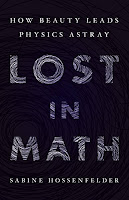In the
previous post in this blog, I discussed the current absence of great men in
many fields of human activity; in particular, in science. Shortly after writing
that post, an
interview with Sabine Hossenfelder in a major Spanish newspaper (La
Vanguardia) made me see that I’m not alone in denouncing the crisis of science,
at least in the field of theoretical physics, which includes theories about the
multiverse, about which, a few weeks ago, I published another
post.
Sabine Hossenfelder is a German theoretical physicist. She has lately become
news by publishing a book: Lost
in Maths: How Beauty Leads Physics Astray (2018), where she asserts that
theoretical physics has progressed practically nothing in the last 60 years,
and advocates dedicating public funds to research the fundamentals of quantum
mechanics, rather than squandering them on colossal particle accelerators or in
research on baseless lucubration, such as string theory and multiverses.
This is what she says in chapter 1 of her book:
After twenty
years in theoretical physics, most people I know make a career by studying
things nobody has seen. They have concocted mind-boggling new theories, like the
idea that our universe is but one of infinitely many that together form a
"multiverse." They have invented dozens of new particles, declared
that we are projections of a higher-dimensional space and that space is spawned
by wormholes that tie together distant places. These ideas are highly
controversial and yet exceedingly popular, speculative yet intriguing, pretty
yet useless. Most of them are so difficult to test, they are practically untestable.
Others are untestable even theoretically. What they have in common is that they
are backed up by theoreticians convinced that... their theories... are too good
to not be true...
I’m not sure anymore
that what we do here, in the foundations of physics, is science. And if not, then
why am I wasting my time with it?
In the indicated interview, Hossenfelder says things like these:
- The
[Higgs] boson was described in 1960, almost 60 years ago. The cosmological
constant was advanced by Einstein 100 years ago. Other discoveries, such
as measuring the mass of neutrinos, start from a theory of the 50s.
- To an interviewer’s question about parallel universes, she answered:
[The multiverse] theories are popular...
I think it's great that you want to talk about them, or we could just talk
about Harry Potter.
- In reference to the multiverse theories, the interviewer asks: What is wrong with having an open mind?
Hossenfelder replies: I have nothing
against crazy ideas, but I am against using public money to investigate
them. Something similar happens with supersymmetry or high energy particle
physics. They are just like a financial bubble: money goes where
researchers go, and they go where money goes... Investing more on the
Geneva particle accelerator is a waste... Now they want a bigger
accelerator precisely to cover its uselessness.
In short: Hossenfelder asserts that the
multiverse and other physical theories are crazy, and that talking about them is equivalent to talking about Harry
Potter. In other words: by developing those theories and
investing money trying to confirm them (which is probably impossible, therefore
the money would be wasted) what is being done is literature, not science; novels,
not theoretical physics.
Let me stand up for Harry Potter: its author never said
that her series of novels was anything other than novels, and the money she
earned with them was paid by the people who bought her books to have a good
time reading them. The problem with many current physicists is that they make novels and try to pass them as though they were
science, and the money they request to carry out their
experiments or sponsor their abstract mathematical analysis without a real
physical basis, is public money they are assigned, in the best case, by other
scientists riding the same car, and in the worst, by officials or politicians
who know very little about science and just follow the trends imposed by the
big press headlines, usually created by journalists who know as little as they
do.
The same post in Spanish
Thematic thread on Multiverse and Fine Tuning: Preceding Next
Thematic Thread on Particle Physics: Previous Next
Manuel Alfonseca


No comments:
Post a Comment